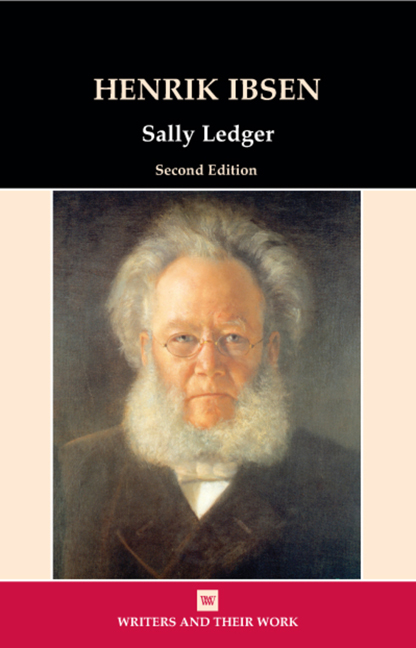Book contents
- Frontmatter
- Dedication
- Contents
- Acknowledgements
- Biographical Outline
- Note on Translations
- Abbreviations
- 1 Ibsenism and A Doll's House
- 2 Ibsen, Realism and ‘Modern’ Drama: From Norwegian Nationalism to Ghosts
- 3 Liberalism and its Discontents: Ibsen's Politics in An Enemy of the People
- 4 Ibsen's Women: The Lady from the Sea, Hedda Gabler and Little Eyolf
- 5 Ibsen, Freud and Psychological Drama: Rosmersholm and Peer Gynt
- 6 Beyond Realism: John Gabriel Borkman and When We Dead Awaken
- 7 Afterword: Ibsen Now
- Notes
- Select Bibliography
- Index
- Recent and Forthcoming Titles in the New Series of WRITERS AND THEIR WORK
4 - Ibsen's Women: The Lady from the Sea, Hedda Gabler and Little Eyolf
- Frontmatter
- Dedication
- Contents
- Acknowledgements
- Biographical Outline
- Note on Translations
- Abbreviations
- 1 Ibsenism and A Doll's House
- 2 Ibsen, Realism and ‘Modern’ Drama: From Norwegian Nationalism to Ghosts
- 3 Liberalism and its Discontents: Ibsen's Politics in An Enemy of the People
- 4 Ibsen's Women: The Lady from the Sea, Hedda Gabler and Little Eyolf
- 5 Ibsen, Freud and Psychological Drama: Rosmersholm and Peer Gynt
- 6 Beyond Realism: John Gabriel Borkman and When We Dead Awaken
- 7 Afterword: Ibsen Now
- Notes
- Select Bibliography
- Index
- Recent and Forthcoming Titles in the New Series of WRITERS AND THEIR WORK
Summary
Ibsen's knowledge of humanity is nowhere more obvious than in his portrayal of women. He amazes me by his painful introspection; he seems to know them better than they know themselves. (James Joyce, ‘Ibsen's New Drama’, 1900)
More than any other modern writer he has proved himself a prophet and an apostle of the cause of woman, no other modern writer has shown more sympathetic comprehension of her nature and its latent powers. (Louie Bennett, ‘Ibsen as a Pioneer of the Woman Movement’, 1910)
From the moment that Ibsen's plays began to be translated and performed in Western Europe in the late nineteenth and early twentieth century, he began to receive remarkable accolades for his dramatic representation of women and womanhood. The extent of his personal sympathies for late-nineteenth-century feminism is rather ambivalent. Whilst in the notes he made for A Doll's House, for example, he reflected that ‘A woman cannot be herself in contemporary society, it is an exclusively male society with laws drafted by men, and with counsel and judges who judge feminine conduct from a male point of view’, in a speech he made at a banquet given in his honour by the Norwegian Women's Rights League on 26 May 1898 he notoriously disavowed the apparent feminism of his dramas:
I am not a member of the Women's Rights League. Whatever I have written has been without any conscious thought of making propaganda. I have been more poet and less social philosopher than people generally seem inclined to believe. I thank you for the toast, but must disclaim the honour of having consciously worked for the women's rights movement. I am not even quite clear as to just what this women's rights movement really is. To me it has seemed a problem of humanity in general.
The ‘problem of humanity in general’ to which Ibsen refers is his preoccupation with the obstacles put in the way of individual liberty and freedom by bourgeois society in the late nineteenth century. It was Ibsen's commitment to individual freedom which appealed to nineteenth-century liberal feminism in Scandinavia and Western Europe, for it was on this that the Women's Movement based its claims for women's independence.
- Type
- Chapter
- Information
- Henrik Ibsen , pp. 33 - 45Publisher: Liverpool University PressPrint publication year: 2008

